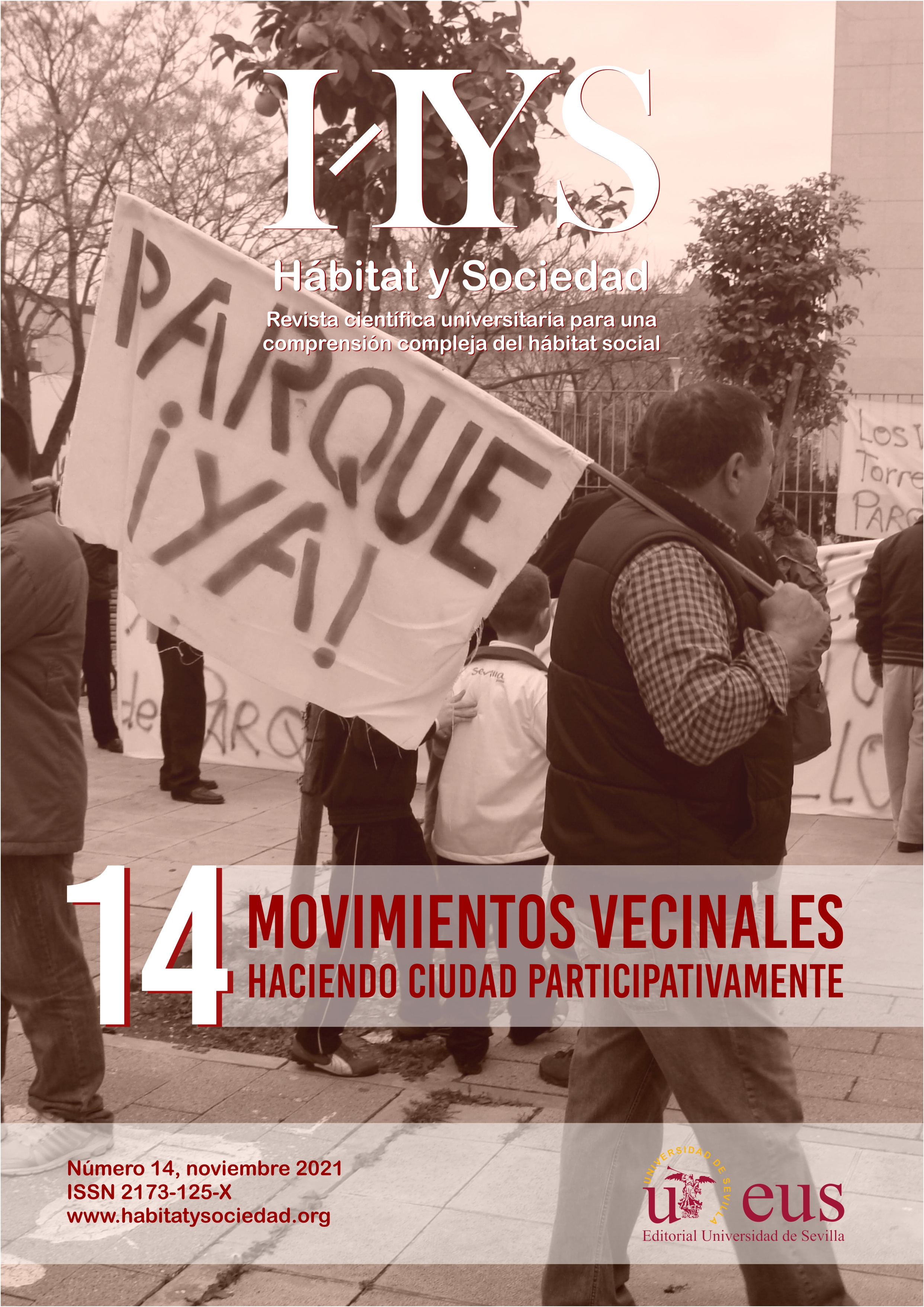Vivienda social: necesidades comunes, caminos comunes y dificultades comunes. La experiencia uruguaya
DOI:
https://doi.org/10.12795/HabitatySociedad.2021.i14.11Palabras clave:
Vivienda y Hábitat, Dificultades, Fortalezas, Autogestión, ComúnResumen
El artículo procura describir un modelo de producción social del hábitat particularmente exitoso, el de las cooperativas de vivienda uruguayas, que tiene ya un desarrollo de más de medio siglo, vinculándolo con las conclusiones de los estudios que sobre el manejo de los bienes comunes por la propia gente realizó durante toda su vida Elinor Ostrom. Se analizan las características y aspectos centrales del sistema cooperativo de vivienda uruguayo, cuyas singularidades principales son la autogestión, la implicación directa de los futuros usuarios, ya sea en trabajo o en ahorro, y la propiedad colectiva de las viviendas, otorgándose del derecho de uso y goce a las familias cooperativistas; se hace una breve presentación de los trabajos de Ostrom, y finalmente se retoma el modelo cooperativo uruguayo, ahora a la luz de esos conceptos. Finalmente, se plantea el alcance que este modelo podría llegar a tener si se lograra el apoyo de los gobiernos, hoy orientado a la empresa privada mercantil, mediante la construcción de un marco jurídico adecuado, el financiamiento y la facilitación del acceso al suelo.
Descargas
Citas
González, G., 1999, Cooperativas de Viviendas por Ayuda Mutua. Una experiencia netamente uruguaya, Montevideo: FUCVAM.
Ley N° 13.728 (“Ley Nacional de Vivienda”), www.impo.com.uy/Normativa.
Ley N° 18.407 (“Ley General de Cooperativas”), www.impo.com.uy/Normativa.
Nahoum, B., 2013, Cooperativas de Vivienda por Ayuda Mutua: Algunas Claves. Reflexiones sobre algunos aspectos esenciales de la vivienda por ayuda mutua, Montevideo: Trilce.
Ortiz, E., 2012, Producción social de vivienda y hábitat: bases conceptuales para una política pública, en El camino posible. Producción Social del Hábitat en América Latina, libro colectivo, Montevideo: Trilce-Centro Cooperativo Sueco.
Ostrom, Elinor, 1990, Governing the Commons. The evolution of Institutions for Collective Action, Cambridge: Cambridge University Press.
Ostrom, Elinor, 2009, El gobierno de los bienes comunes. La evolución de las instituciones de acción colectiva, México: UNAM-CRIM-FCE.
Presidencia de la República, Uruguay, 1972, Régimen Jurídico de una Política de Vivienda, Montevideo, Oficina de Publicaciones de la Prosecretaría de Difusión e Información de la Presidencia de la República: Montevideo.
Publicado
Cómo citar
Número
Sección
Licencia
Derechos de autor 2021 De los autores y Editorial Universidad de Sevilla

Esta obra está bajo una licencia internacional Creative Commons Atribución-NoComercial-CompartirIgual 4.0.
Los textos publicados se considerarán propiedad intelectual de los autores y de la revista. Podrán ser usados para usos educativos y académicos, citando al autor y la publicación, con la dirección electrónica exacta. En todo caso, deberá comunicarse este tipo de uso y pedir la autorización del mismo a la dirección de la revista.
Los autores/as que publiquen en esta revista aceptan las siguientes condiciones:
- Los autores/as conservan los derechos de autor y ceden a la revista el derecho de la primera publicación, con el trabajo registrado con la licencia de atribución de Creative Commons, que permite a terceros utilizar lo publicado siempre que mencionen la autoría del trabajo y la primera publicación en esta revista.
- Los autores/as pueden realizar otros acuerdos contractuales independientes y adicionales para la distribución no exclusiva de la versión del artículo publicado en esta revista (p. ej., incluirlo en un repositorio institucional o publicarlo en un libro) siempre que indiquen claramente que el trabajo se publicó por primera vez en esta revista.
- Se permite y recomienda a los autores/as publicar su trabajo en Internet (por ejemplo en páginas institucionales o personales) antes y durante el proceso de revisión y publicación, ya que puede conducir a intercambios productivos y a una mayor y más rápida difusión del trabajo publicado (véase The Effect of Open Access).












